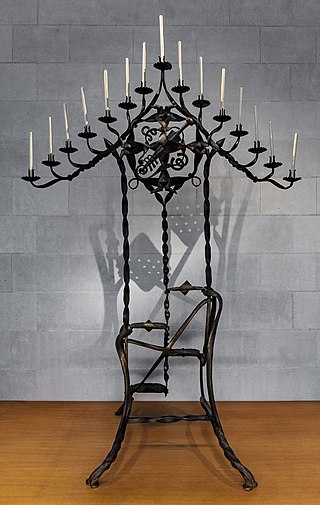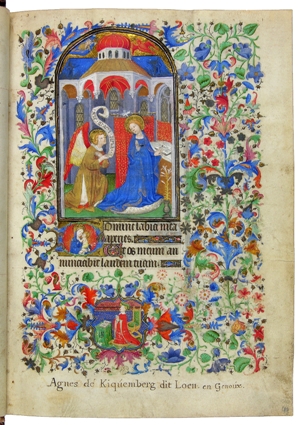
In the practice of Christianity, canonical hours mark the divisions of the day in terms of fixed times of prayer at regular intervals. A book of hours, chiefly a breviary, normally contains a version of, or selection from, such prayers.

Matins is a canonical hour in Christian liturgy, originally sung during the darkness of early morning.

Lauds is a canonical hour of the Divine office. In the Roman Rite Liturgy of the Hours it is one of the major hours, usually held after Matins, in the early morning hours.

Tenebrae is a religious service of Western Christianity held during the three days preceding Easter Day, and characterized by gradual extinguishing of candles, and by a "strepitus" or "loud noise" taking place in total darkness near the end of the service.

A missal is a liturgical book containing instructions and texts necessary for the celebration of Mass throughout the liturgical year. Versions differ across liturgical tradition, period, and purpose, with some missals intended to enable a priest to celebrate Mass publicly and others for private and lay use. The texts of the most common Eucharistic liturgy in the world, the Catholic Church's Mass of Paul VI of the Roman Rite, are contained in the 1970 edition of the Roman Missal.
Christian liturgy is a pattern for worship used by a Christian congregation or denomination on a regular basis. The term liturgy comes from Greek and means "public work". Within Christianity, liturgies descending from the same region, denomination, or culture are described as ritual families.

The Liturgy of the Hours, Divine Office, or Opus Dei are a set of Catholic prayers comprising the canonical hours, often also referred to as the breviary, of the Latin Church. The Liturgy of the Hours forms the official set of prayers "marking the hours of each day and sanctifying the day with prayer." The term "Liturgy of the Hours" has been retroactively applied to the practices of saying the canonical hours in both the Christian East and West–particularly within the Latin liturgical rites–prior to the Second Vatican Council, and is the official term for the canonical hours promulgated for usage by the Latin Church in 1971. Before 1971, the official form for the Latin Church was the Breviarium Romanum, first published in 1568 with major editions through 1962.
Prime, or the First Hour, is one of the canonical hours of the Divine Office, said at the first hour of daylight, between the dawn hour of Lauds and the 9 a.m. hour of Terce. It remains part of the Christian liturgies of Eastern Christianity, but suppressed within the Latin liturgical rites by the Second Vatican Council. In the Coptic Church, a denomination of Oriental Orthodox Christianity, the office of Prime is prayed at 6 am in eastward direction of prayer by all members in this denomination, both clergy and laity, being one of the seven fixed prayer times. Latin Catholic clergy under obligation to celebrate the Liturgy of the Hours may still fulfil their obligation by using the edition of the Roman Breviary promulgated by Pope John XXIII in 1962, which contains Prime. Like all the liturgical hours, except the Office of Readings, it consists mainly of Psalms. It is one of the Little Hours.

Nocturns is a Christian canonical hour said in the nighttime.

The Anglican Missal is a liturgical book used liturgically by some Anglo-Catholics and other High Church Anglicans as an alternative or supplement to editions of the Book of Common Prayer. The Anglican Missal is distinct from the similarly Anglo-Catholic English Missal, as the Anglican Missal is not primarily a translation of the Roman Missal of the Catholic Church.
A prayer book is a book containing prayers and perhaps devotional readings, for private or communal use, or in some cases, outlining the liturgy of religious services. Books containing mainly orders of religious services, or readings for them are termed "service books" or "liturgical books", and are thus not prayer-books in the strictest sense, but the term is often used very loosely. A religion's scriptures might also be considered prayer books as well.

Latin liturgical rites, or Western liturgical rites, is a large family of liturgical rites and uses of public worship employed by the Latin Church, the largest particular church sui iuris of the Catholic Church, that originated in Europe where the Latin language once dominated. Its language is now known as Ecclesiastical Latin. The most used rite is the Roman Rite.
The English Missal is a translation of the Roman Missal used by some Anglo-Catholic parish churches. After its publication by W. Knott & Son Limited in 1912, The English Missal was rapidly endorsed by the growing Ritualist movement of Anglo-Catholic clergy, who viewed the liturgies of the Book of Common Prayer as insufficient expressions of fully Catholic worship. The translation of the Roman Missal from Latin into the stylized Elizabethan Early Modern English of the Book of Common Prayer allowed clergy to preserve the use of the vernacular language while adopting the Roman Catholic texts and liturgical rubrics.
In Christian liturgical worship, Preces, also known in Anglican prayer as the Suffrages or Responses, are short petitions said or sung as versicles and responses by the officiant and congregation respectively. Versicle-and-response is one of the oldest forms of prayer in Christianity, with its roots in Hebrew prayer during the time of the Temple in Jerusalem. In many prayer books the versicles and responses comprising the Preces are denoted by special glyphs:

A liturgical book, or service book, is a book published by the authority of a church body that contains the text and directions for the liturgy of its official religious services.

A breviary is a liturgical book used in Christianity for praying the canonical hours, usually recited at seven fixed prayer times.

The Society of SS. Peter and Paul (SSPP) was an English Anglo-Catholic publishing company, sometimes mistakenly thought to have been in the tradition of Anglican Papalism. It was established in 1911 as a reaction to the works of the Anglican priest and liturgist Percy Dearmer, particularly The Parson's Handbook which advocated a liturgical style allegedly distinct to England, and rooted in the Sarum rite.
Fixed prayer times, praying at dedicated times during the day, are common practice in major world religions such as Christianity, Islam, and Judaism.

The Divine Worship: Daily Office is the series of approved liturgical books of the Anglican Use Divine Offices for the personal ordinariates in the Catholic Church. Derived from multiple Anglican and Catholic sources, the Divine Worship: Daily Office replaces prior Anglican Use versions of the Liturgy of the Hours and the Anglican daily office. Alongside other Anglican Use books officially known as "Divine Worship", including the Divine Worship: The Missal, Divine Worship: Daily Office is considered a liturgical use of the Roman Rite.
Anglican liturgy usually refers to liturgies according the Book of Common Prayer and its derivatives. It may also refer to the following liturgies and liturgical books used by churches and groups in the Anglican Christian tradition:












